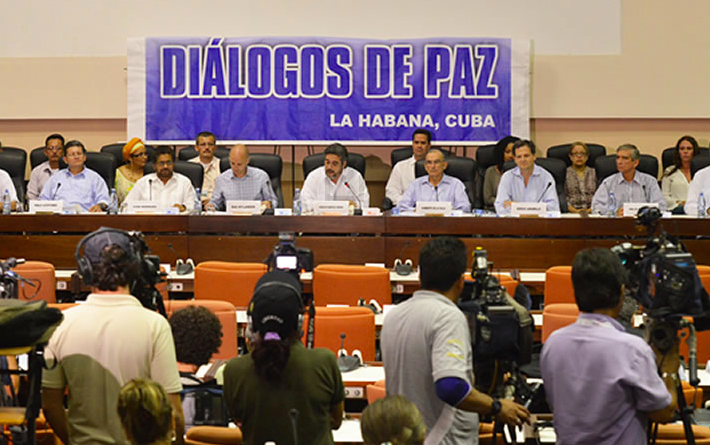
Delegations from the Colombian government and the FARC during the closing remarks of the fourth topic on the Agenda of Discussions: “Solution to the problem of illicit drugs” in the Convention Center in Havana, Cuba on May 16, 2014. Photo: Omar Nieto Remolina – SIG. Office of the President of Colombia
Colombia has found itself on shaky ground in Havana, Cuba, ever since peace talks between the Colombian government and militant group FARC in Havana, Cuba were suspended due to the kidnapping of an army general and two of his companions.
At the time of this post's publishing, representatives of Cuba and Norway — guarantor countries of the peace process – announced in Havana that FARC agreed to release Gen. Alzate, along with a civilian lawyer and a corporal who were traveling with him, plus two soldiers captured a week earlier in the department of Arauca near the Venezuelan border.
Colombians have been voicing their opinions under the Twitter hashtag #TreguaYa, which means “truce now” in Spanish. Diana Marcela Otavo, (@dianamotavo), published the following tweet:
La paz en medio de las balas es difícil de conseguir, #TreguaYa necesitamos que @JuanManSantos y las Farc se sienten nuevamente a dialogar
— Diana Marcela Otavo (@dianamotavo) November 17, 2014
It is difficult to achieve peace when bullets are flying. #TreguaYa we need @JuanManSantos and the FARC to come back to the table and talk
Francisco Javier Cuadros also posted (@fjaviercuadrs):
Sin ser fatalistas,sí se acaba este proceso de paz pasarán 10 años para volver a dialogar, con miles de muertos mas.#TreguaYa #CeseBilateral
— Fco. Javier Cuadros (@fjaviercuadros) November 17, 2014
At the risk of sounding pessimistic, if this peace process ends it will be another 10 years with thousands more dead before talks resume.#TreguaYa #CeseBilateral (bilateral ceasefire)
The FARC is Colombia’s largest guerrilla group. It was established in 1964 by survivors of a government crackdown on a Communist-inspired peasant group, and has long financed its 50-year-old war against the government by kidnapping, extortion and participating in the drug trade on various levels.
The agenda of the peace talks covers six issues: land reform, political participation, drug trafficking, rights of victims, disarmament of the rebels, the implementation of the peace deal.
Political leaders of various ideologies have also protested the suspension.
Senator for the Democratic Pole Iván Cepeda, for example, wrote on the subject of a protest in Bogotá on the morning of November 19:
La gente sale a la calle para defender el proceso de paz y #TreguaYA pic.twitter.com/X42vBDw5Sb — Iván Cepeda Castro (@IvanCepedaCast) November 19, 2014
The people are taking to the streets to defend the peace process and #TreguaYA
[In the photo: “The people have the key to peace.”]
Meanwhile, Mayor of Bogotá and former leftist rebel Gustavo Petro commented:
Nuestros hijos no se merecen la guerra, llegó la hora de movilizarnos por la Paz. #TreguaYA
— Gustavo Petro (@petrogustavo) November 17, 2014
Our children do not deserve war, the time has come to stand up for Peace. #TreguaYA
On the night of November 19, Medellin residents joined together in the streets as shown by Juan Mosquera @lluevelove in the photo below:
“No suspendan los diálogos, suspendan la guerra” Ciudadanos ejerciendo ciudadanía hoy en el centro de Medellín pic.twitter.com/nnYZUoheaZ
— juan mosquera (@lluevelove) November 20, 2014
“Don't end the talks, end the war” Citizens practicing their civic duty in the center of Medellin
Finally, during the first week of November, author JR shared the following thoughts via the blog La paz en Colombia (Peace in Colombia):
Nadie sale bien librado de una guerra, ni víctimas ni victimarios. Si ante los unos cabe respetar y reparar su inmenso dolor, ante los otros cabe corresponder con decoro a su declarado arrepentimiento, con apego a la ley por sobre todo lo que intenta desvirtuarla.
When it comes to war, no one gets off lightly; neither the victims nor the victors. If in the presence of some we can respect and heal their incredible grief, we must in the presence of others respectfully respond to their declarations of regret, with adherence to the law above all things that try to distort it.
This November 19 marked two years since the Colombian peace process began in Havana, Cuba. You can read more about the talks on the Spanish-language “Official website of the round-table discussions for ending the conflict and building lasting peace in Colombia.”







3 comments